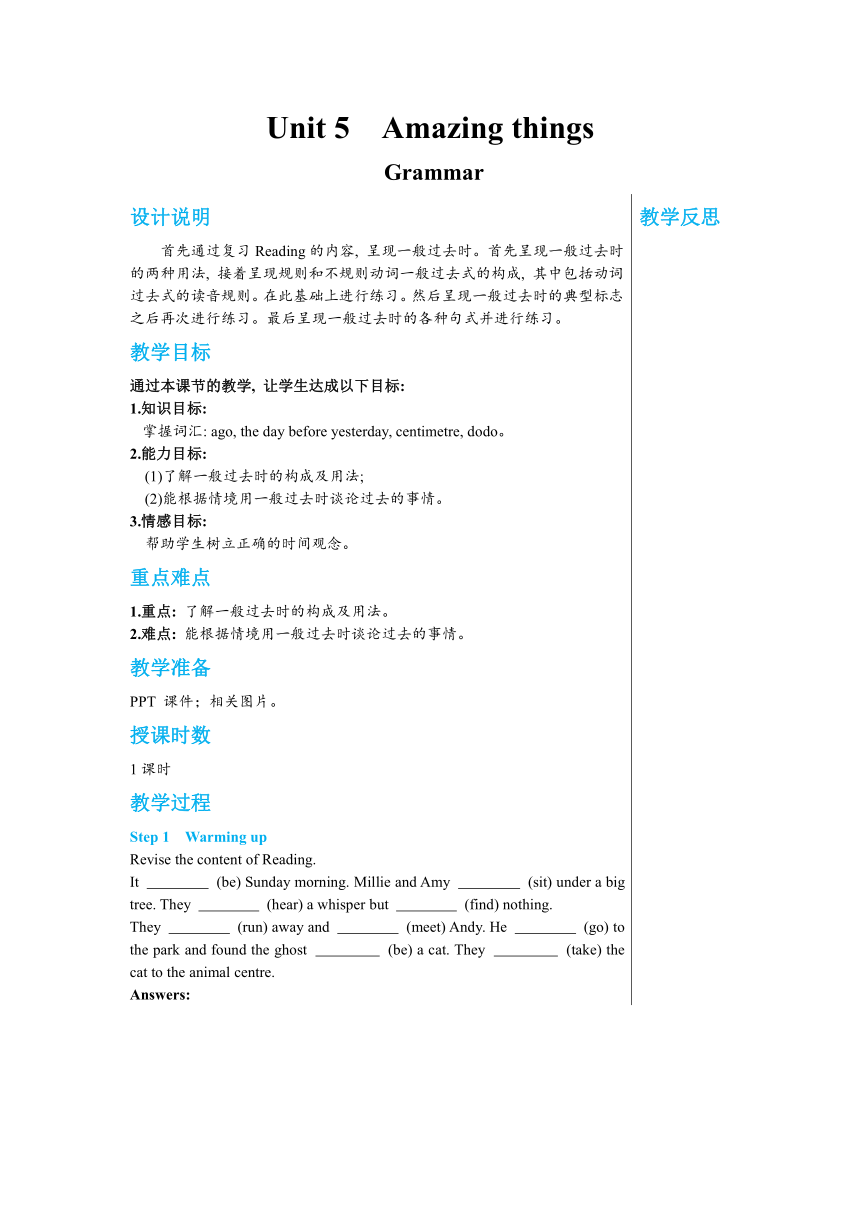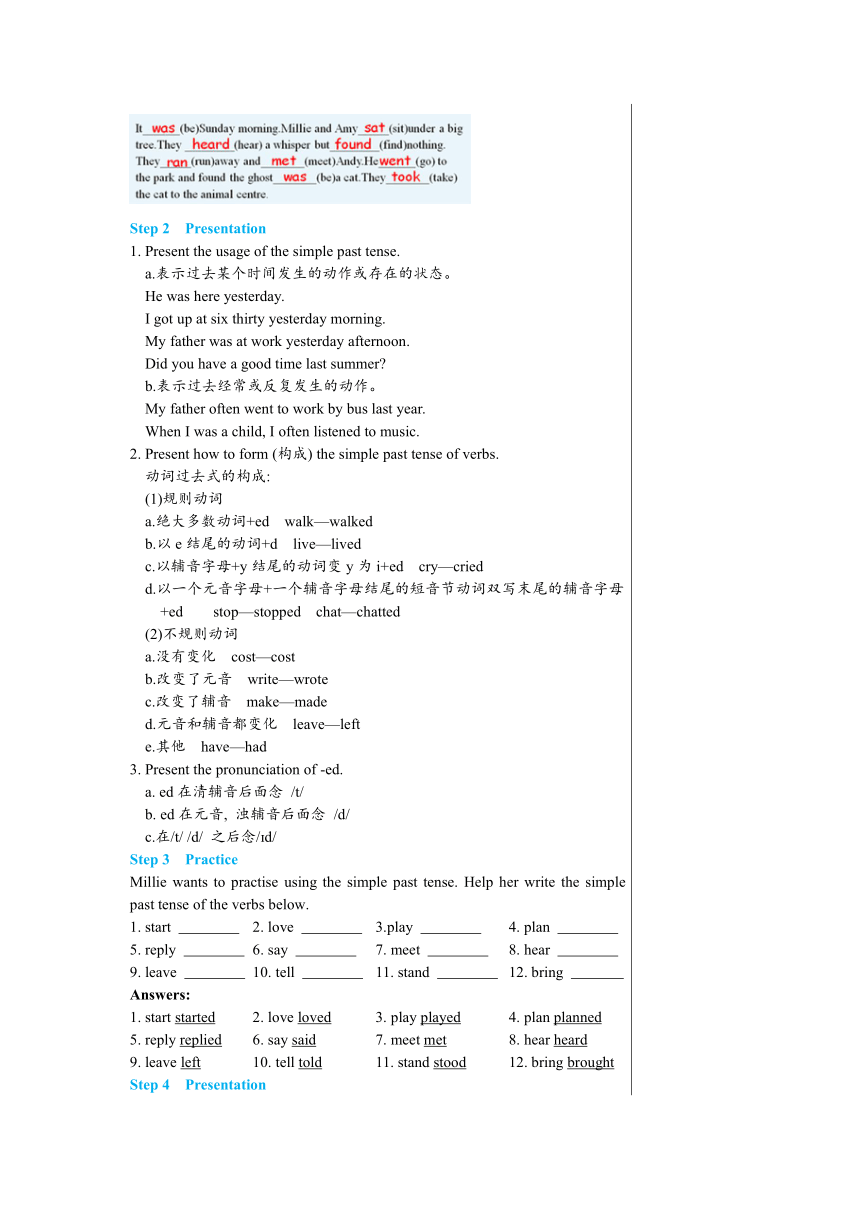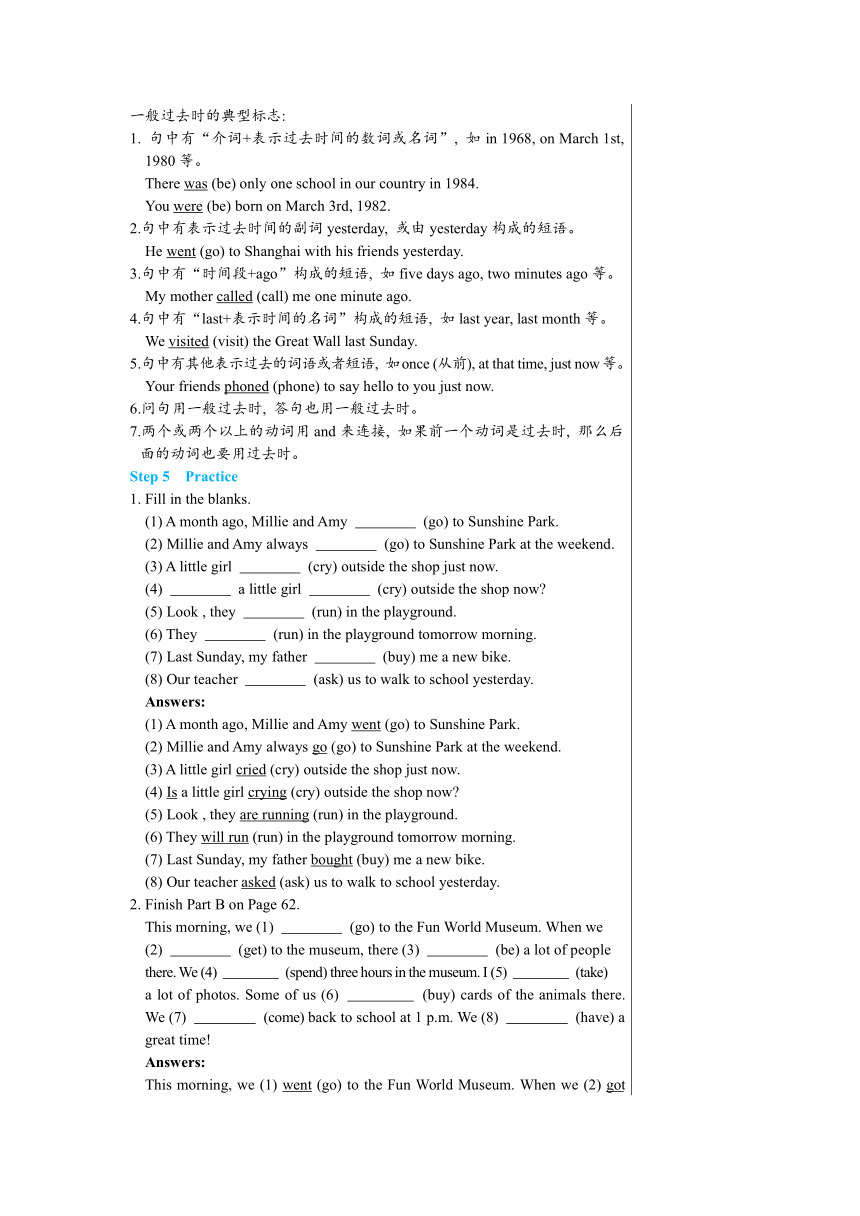Unit 5 Grammar教学详案-译林牛津版初中英语七年级(下)
文档属性
| 名称 | Unit 5 Grammar教学详案-译林牛津版初中英语七年级(下) |

|
|
| 格式 | docx | ||
| 文件大小 | 195.5KB | ||
| 资源类型 | 试卷 | ||
| 版本资源 | 牛津译林版 | ||
| 科目 | 英语 | ||
| 更新时间 | 2024-02-21 19:45:06 | ||
图片预览



文档简介
Unit 5 Amazing things
Grammar
设计说明 首先通过复习Reading的内容, 呈现一般过去时。首先呈现一般过去时的两种用法, 接着呈现规则和不规则动词一般过去式的构成, 其中包括动词过去式的读音规则。在此基础上进行练习。然后呈现一般过去时的典型标志之后再次进行练习。最后呈现一般过去时的各种句式并进行练习。 教学目标 通过本课节的教学, 让学生达成以下目标: 1.知识目标: 掌握词汇: ago, the day before yesterday, centimetre, dodo。 2.能力目标: (1)了解一般过去时的构成及用法; (2)能根据情境用一般过去时谈论过去的事情。 3.情感目标: 帮助学生树立正确的时间观念。 重点难点 1.重点: 了解一般过去时的构成及用法。 2.难点: 能根据情境用一般过去时谈论过去的事情。 教学准备 PPT 课件;相关图片。 授课时数 1课时 教学过程 Step 1 Warming up Revise the content of Reading. It (be) Sunday morning. Millie and Amy (sit) under a big tree. They (hear) a whisper but (find) nothing. They (run) away and (meet) Andy. He (go) to the park and found the ghost (be) a cat. They (take) the cat to the animal centre. Answers: Step 2 Presentation 1. Present the usage of the simple past tense. a.表示过去某个时间发生的动作或存在的状态。 He was here yesterday. I got up at six thirty yesterday morning. My father was at work yesterday afternoon. Did you have a good time last summer b.表示过去经常或反复发生的动作。 My father often went to work by bus last year. When I was a child, I often listened to music. 2. Present how to form (构成) the simple past tense of verbs. 动词过去式的构成: (1)规则动词 a.绝大多数动词+ed walk—walked b.以e结尾的动词+d live—lived c.以辅音字母+y结尾的动词变y为i+ed cry—cried d.以一个元音字母+一个辅音字母结尾的短音节动词双写末尾的辅音字母+ed stop—stopped chat—chatted (2)不规则动词 a.没有变化 cost—cost b.改变了元音 write—wrote c.改变了辅音 make—made d.元音和辅音都变化 leave—left e.其他 have—had 3. Present the pronunciation of -ed. a. ed在清辅音后面念 /t/ b. ed在元音, 浊辅音后面念 /d/ c.在/t/ /d/ 之后念/ d/ Step 3 Practice Millie wants to practise using the simple past tense. Help her write the simple past tense of the verbs below. 1. start 2. love 3.play 4. plan 5. reply 6. say 7. meet 8. hear 9. leave 10. tell 11. stand 12. bring Answers: 1. start started 2. love loved 3. play played 4. plan planned 5. reply replied 6. say said 7. meet met 8. hear heard 9. leave left 10. tell told 11. stand stood 12. bring brought Step 4 Presentation 一般过去时的典型标志: 1. 句中有“介词+表示过去时间的数词或名词”, 如in 1968, on March 1st, 1980等。 There was (be) only one school in our country in 1984. You were (be) born on March 3rd, 1982. 2.句中有表示过去时间的副词yesterday, 或由yesterday构成的短语。 He went (go) to Shanghai with his friends yesterday. 3.句中有“时间段+ago”构成的短语, 如five days ago, two minutes ago等。 My mother called (call) me one minute ago. 4.句中有“last+表示时间的名词”构成的短语, 如last year, last month等。 We visited (visit) the Great Wall last Sunday. 5.句中有其他表示过去的词语或者短语, 如once (从前), at that time, just now等。 Your friends phoned (phone) to say hello to you just now. 6.问句用一般过去时, 答句也用一般过去时。 7.两个或两个以上的动词用and来连接, 如果前一个动词是过去时, 那么后面的动词也要用过去时。 Step 5 Practice 1. Fill in the blanks. (1) A month ago, Millie and Amy (go) to Sunshine Park. (2) Millie and Amy always (go) to Sunshine Park at the weekend. (3) A little girl (cry) outside the shop just now. (4) a little girl (cry) outside the shop now (5) Look , they (run) in the playground. (6) They (run) in the playground tomorrow morning. (7) Last Sunday, my father (buy) me a new bike. (8) Our teacher (ask) us to walk to school yesterday. Answers: (1) A month ago, Millie and Amy went (go) to Sunshine Park. (2) Millie and Amy always go (go) to Sunshine Park at the weekend. (3) A little girl cried (cry) outside the shop just now. (4) Is a little girl crying (cry) outside the shop now (5) Look , they are running (run) in the playground. (6) They will run (run) in the playground tomorrow morning. (7) Last Sunday, my father bought (buy) me a new bike. (8) Our teacher asked (ask) us to walk to school yesterday. 2. Finish Part B on Page 62. This morning, we (1) (go) to the Fun World Museum. When we (2) (get) to the museum, there (3) (be) a lot of people there. We (4) (spend) three hours in the museum. I (5) (take) a lot of photos. Some of us (6) (buy) cards of the animals there. We (7) (come) back to school at 1 p.m. We (8) (have) a great time! Answers: This morning, we (1) went (go) to the Fun World Museum. When we (2) got (get) to the museum, there (3) were (be) a lot of people there. We (4) spent (spend) three hours in the museum. I (5) took (take) a lot of photos. Some of us (6) bought (buy) cards of the animals there. We (7) came (come) back to school at 1 p.m. We (8) had (have) a great time! Step 6 Presentation 1.一般过去时的句子结构: (1)肯定句 主语+谓语动词过去式+其他. He heard a whisper. They went to the park again last Sunday. (2)否定句 主语 + didn’t +谓语动词原形+其他. I didn’t go to the park yesterday morning. He didn’t hear a whisper. They didn’t find anything in the bushes. (3)一般疑问句 Did +主语+谓语动词原形+其他 Yes, 代词+did. / No, 代词+ didn’t. —Did you go to the park yesterday morning —Yes, I did. —Did he hear a whisper —No, he didn’t. Step 7 Practice Finish Part C on Page 62. Millie: We (1) (go) to the Fun World Museum the day before yesterday, Daniel. It (2) (be) so interesting! Daniel: Really Tell me all about it. Millie: OK. We (3) (see) a small monkey, only 11 centimetres tall! Daniel: That’s amazing! What else Millie: We also (4) (learn) about some strange birds like dodos. They (5) (live) on the earth a long time ago. Daniel: That’s cool! Answers: Millie: We (1) went (go) to the Fun World Museum the day before yesterday, Daniel. It (2) was (be) so interesting! Daniel: Really Tell me all about it. Millie: OK. We (3) saw (see) a small monkey, only 11 centimetres tall! Daniel: That’s amazing! What else Millie: We also (4) learned/learnt (learn) about some strange birds like dodos. They (5) lived (live) on the earth a long time ago. Daniel: That’s cool! Step 8 Summary Summarize all the points about the simple past tense. Step 9 Homework 1. Try to remember the simple past of irregular verbs as many as possible. 2. Preview Integrated skills. 当堂达标 Ⅰ. 单项选择 1. He his grandparents in the countryside last week. A. visits B. visit C. visited D. visiting 2. — How was the volleyball game yesterday — Oh, it was fantastic! We so much fun. A. have B. had C. are having D. will have 3. Hi, everyone! Please write three facts you last term in your project. A. learned B. are learning C. will learn D. learn 4. Tony me how to speak Chinese at his home the day before yesterday. A. teaches B. will teach C. is teaching D. taught 5. He me his name, but I can’t remember it now. A. tells B. will tell C. told D. is telling 6. I that movie with my friends last month. It was amazing. A. watch B. watched C. watches D. have watched 7. — Have you ever been to Shanghai — Of course. Actually, I there last year but now I live in Taizhou. A. worked B. was working C. would work D. have worked Ⅱ. 根据汉语提示或用括号内所给单词的适当形式填空 1. Children over 130 (厘米) tall need to pay when they take a bus. 2. A month (以前), Millie and Amy went to Sunshine Town. 3. A lot of people came to visit the Fun World (博物馆) yesterday. 4. Hi, Millie. There is (某人) waiting for you outside. 5. The boys heard the (奇怪的) noise in the park just now. 6. He (wake) up to find himself outside the house yesterday morning. 7. — Where did you go last weekend — I (go) to the Great Wall. 8. We (have) a great time when we were in Lake Park. 9. She (hear) from her parents the day before yesterday. 10. These singers (sing) several songs at the concert last night. Their fans screamed (尖叫) excitedly. 11. In the playground, I threw the ball to her and she (catch) it. 12. In the past, the scientists (keep) this discovery a secret to the public. 13. Three years ago, the shopping centre (lie) in the centre of town. 14. A big surprise to see you! I (think) you would come back tomorrow. Answers:Ⅰ. 1-5 CBADC 6-7 BA Ⅱ. 1. centimetres 2. ago 3. Museum 4. somebody 5. strange 6. woke 7. went 8. had 9. heard 10. sang 11. caught 12. kept 13. lay 14.thought 板书设计 Unit 5 Amazing things Grammarago, the day before yesterday, centimetre, dodo一般过去时: a.表示过去某个时间发生的动作或存在的状态。 b.表示过去经常或反复发生的动作。
教学反思
Grammar
设计说明 首先通过复习Reading的内容, 呈现一般过去时。首先呈现一般过去时的两种用法, 接着呈现规则和不规则动词一般过去式的构成, 其中包括动词过去式的读音规则。在此基础上进行练习。然后呈现一般过去时的典型标志之后再次进行练习。最后呈现一般过去时的各种句式并进行练习。 教学目标 通过本课节的教学, 让学生达成以下目标: 1.知识目标: 掌握词汇: ago, the day before yesterday, centimetre, dodo。 2.能力目标: (1)了解一般过去时的构成及用法; (2)能根据情境用一般过去时谈论过去的事情。 3.情感目标: 帮助学生树立正确的时间观念。 重点难点 1.重点: 了解一般过去时的构成及用法。 2.难点: 能根据情境用一般过去时谈论过去的事情。 教学准备 PPT 课件;相关图片。 授课时数 1课时 教学过程 Step 1 Warming up Revise the content of Reading. It (be) Sunday morning. Millie and Amy (sit) under a big tree. They (hear) a whisper but (find) nothing. They (run) away and (meet) Andy. He (go) to the park and found the ghost (be) a cat. They (take) the cat to the animal centre. Answers: Step 2 Presentation 1. Present the usage of the simple past tense. a.表示过去某个时间发生的动作或存在的状态。 He was here yesterday. I got up at six thirty yesterday morning. My father was at work yesterday afternoon. Did you have a good time last summer b.表示过去经常或反复发生的动作。 My father often went to work by bus last year. When I was a child, I often listened to music. 2. Present how to form (构成) the simple past tense of verbs. 动词过去式的构成: (1)规则动词 a.绝大多数动词+ed walk—walked b.以e结尾的动词+d live—lived c.以辅音字母+y结尾的动词变y为i+ed cry—cried d.以一个元音字母+一个辅音字母结尾的短音节动词双写末尾的辅音字母+ed stop—stopped chat—chatted (2)不规则动词 a.没有变化 cost—cost b.改变了元音 write—wrote c.改变了辅音 make—made d.元音和辅音都变化 leave—left e.其他 have—had 3. Present the pronunciation of -ed. a. ed在清辅音后面念 /t/ b. ed在元音, 浊辅音后面念 /d/ c.在/t/ /d/ 之后念/ d/ Step 3 Practice Millie wants to practise using the simple past tense. Help her write the simple past tense of the verbs below. 1. start 2. love 3.play 4. plan 5. reply 6. say 7. meet 8. hear 9. leave 10. tell 11. stand 12. bring Answers: 1. start started 2. love loved 3. play played 4. plan planned 5. reply replied 6. say said 7. meet met 8. hear heard 9. leave left 10. tell told 11. stand stood 12. bring brought Step 4 Presentation 一般过去时的典型标志: 1. 句中有“介词+表示过去时间的数词或名词”, 如in 1968, on March 1st, 1980等。 There was (be) only one school in our country in 1984. You were (be) born on March 3rd, 1982. 2.句中有表示过去时间的副词yesterday, 或由yesterday构成的短语。 He went (go) to Shanghai with his friends yesterday. 3.句中有“时间段+ago”构成的短语, 如five days ago, two minutes ago等。 My mother called (call) me one minute ago. 4.句中有“last+表示时间的名词”构成的短语, 如last year, last month等。 We visited (visit) the Great Wall last Sunday. 5.句中有其他表示过去的词语或者短语, 如once (从前), at that time, just now等。 Your friends phoned (phone) to say hello to you just now. 6.问句用一般过去时, 答句也用一般过去时。 7.两个或两个以上的动词用and来连接, 如果前一个动词是过去时, 那么后面的动词也要用过去时。 Step 5 Practice 1. Fill in the blanks. (1) A month ago, Millie and Amy (go) to Sunshine Park. (2) Millie and Amy always (go) to Sunshine Park at the weekend. (3) A little girl (cry) outside the shop just now. (4) a little girl (cry) outside the shop now (5) Look , they (run) in the playground. (6) They (run) in the playground tomorrow morning. (7) Last Sunday, my father (buy) me a new bike. (8) Our teacher (ask) us to walk to school yesterday. Answers: (1) A month ago, Millie and Amy went (go) to Sunshine Park. (2) Millie and Amy always go (go) to Sunshine Park at the weekend. (3) A little girl cried (cry) outside the shop just now. (4) Is a little girl crying (cry) outside the shop now (5) Look , they are running (run) in the playground. (6) They will run (run) in the playground tomorrow morning. (7) Last Sunday, my father bought (buy) me a new bike. (8) Our teacher asked (ask) us to walk to school yesterday. 2. Finish Part B on Page 62. This morning, we (1) (go) to the Fun World Museum. When we (2) (get) to the museum, there (3) (be) a lot of people there. We (4) (spend) three hours in the museum. I (5) (take) a lot of photos. Some of us (6) (buy) cards of the animals there. We (7) (come) back to school at 1 p.m. We (8) (have) a great time! Answers: This morning, we (1) went (go) to the Fun World Museum. When we (2) got (get) to the museum, there (3) were (be) a lot of people there. We (4) spent (spend) three hours in the museum. I (5) took (take) a lot of photos. Some of us (6) bought (buy) cards of the animals there. We (7) came (come) back to school at 1 p.m. We (8) had (have) a great time! Step 6 Presentation 1.一般过去时的句子结构: (1)肯定句 主语+谓语动词过去式+其他. He heard a whisper. They went to the park again last Sunday. (2)否定句 主语 + didn’t +谓语动词原形+其他. I didn’t go to the park yesterday morning. He didn’t hear a whisper. They didn’t find anything in the bushes. (3)一般疑问句 Did +主语+谓语动词原形+其他 Yes, 代词+did. / No, 代词+ didn’t. —Did you go to the park yesterday morning —Yes, I did. —Did he hear a whisper —No, he didn’t. Step 7 Practice Finish Part C on Page 62. Millie: We (1) (go) to the Fun World Museum the day before yesterday, Daniel. It (2) (be) so interesting! Daniel: Really Tell me all about it. Millie: OK. We (3) (see) a small monkey, only 11 centimetres tall! Daniel: That’s amazing! What else Millie: We also (4) (learn) about some strange birds like dodos. They (5) (live) on the earth a long time ago. Daniel: That’s cool! Answers: Millie: We (1) went (go) to the Fun World Museum the day before yesterday, Daniel. It (2) was (be) so interesting! Daniel: Really Tell me all about it. Millie: OK. We (3) saw (see) a small monkey, only 11 centimetres tall! Daniel: That’s amazing! What else Millie: We also (4) learned/learnt (learn) about some strange birds like dodos. They (5) lived (live) on the earth a long time ago. Daniel: That’s cool! Step 8 Summary Summarize all the points about the simple past tense. Step 9 Homework 1. Try to remember the simple past of irregular verbs as many as possible. 2. Preview Integrated skills. 当堂达标 Ⅰ. 单项选择 1. He his grandparents in the countryside last week. A. visits B. visit C. visited D. visiting 2. — How was the volleyball game yesterday — Oh, it was fantastic! We so much fun. A. have B. had C. are having D. will have 3. Hi, everyone! Please write three facts you last term in your project. A. learned B. are learning C. will learn D. learn 4. Tony me how to speak Chinese at his home the day before yesterday. A. teaches B. will teach C. is teaching D. taught 5. He me his name, but I can’t remember it now. A. tells B. will tell C. told D. is telling 6. I that movie with my friends last month. It was amazing. A. watch B. watched C. watches D. have watched 7. — Have you ever been to Shanghai — Of course. Actually, I there last year but now I live in Taizhou. A. worked B. was working C. would work D. have worked Ⅱ. 根据汉语提示或用括号内所给单词的适当形式填空 1. Children over 130 (厘米) tall need to pay when they take a bus. 2. A month (以前), Millie and Amy went to Sunshine Town. 3. A lot of people came to visit the Fun World (博物馆) yesterday. 4. Hi, Millie. There is (某人) waiting for you outside. 5. The boys heard the (奇怪的) noise in the park just now. 6. He (wake) up to find himself outside the house yesterday morning. 7. — Where did you go last weekend — I (go) to the Great Wall. 8. We (have) a great time when we were in Lake Park. 9. She (hear) from her parents the day before yesterday. 10. These singers (sing) several songs at the concert last night. Their fans screamed (尖叫) excitedly. 11. In the playground, I threw the ball to her and she (catch) it. 12. In the past, the scientists (keep) this discovery a secret to the public. 13. Three years ago, the shopping centre (lie) in the centre of town. 14. A big surprise to see you! I (think) you would come back tomorrow. Answers:Ⅰ. 1-5 CBADC 6-7 BA Ⅱ. 1. centimetres 2. ago 3. Museum 4. somebody 5. strange 6. woke 7. went 8. had 9. heard 10. sang 11. caught 12. kept 13. lay 14.thought 板书设计 Unit 5 Amazing things Grammarago, the day before yesterday, centimetre, dodo一般过去时: a.表示过去某个时间发生的动作或存在的状态。 b.表示过去经常或反复发生的动作。
教学反思
